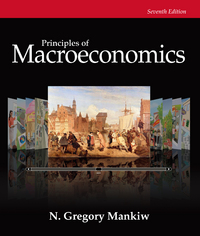Question
Choose one current event. Describe the event and discuss the economic implications of this event. What economic effects might this have at the individual and
- Choose one current event. Describe the event and discuss the economic implications of this event. What economic effects might this have at the individual and societal levels?
- What are the costs of "freebie" items?
- How does the stock market influence the finances of individuals, even if they don't personally invest?
- Think about the larger economic situation in your country right now. How do the overall economy and its various aspects impact your life and finances?
- How can the fiscal policies of a country influence individual finances? ______________________________________________________________________________________________________________________________ PART 2: In this activity, you'll watch two videos related to attitudes about saving, spending, and debt. You'll then answer a series of short answer questions based on the topics covered in those videos. You can answer the questions in a document or record your answers in an audio or video recording.
Step 1: Watch the Videos
Watch the following Ted Talks:
Shlomo Benartzi, "Saving for tomorrow, tomorrow."
Adam Davidson, "What we learned from teetering on the fiscal cliff."
Step 2: Answer the Questions
Based on the videos (and your own research if needed), answer the following questions. Please answer in complete sentences and include the original question in your answer.
Saving for Tomorrow, Tomorrow
- Shlomo Benartzi begins his talk by outlining three things that we as a people are not doing well. What are these three things? Do you agree or disagree with his evaluation of these things?
- What is behavioral finance? What does behavioral finance have to do with personal and family finance?
- What are some of the behavioral obstacles that influence personal finance as described by Benartzi?
- What is Benartzi's solution to all of these behavioral challenges that effect personal finance? How does improved personal finance benefit the economy in general?
What Can We Learn from Teetering on the Fiscal Cliff
- Based on what Davidson says, how would you describe the term 'fiscal cliff'?
- Davidson describes two fundamentally different economic philosophies that both impact the debt crisis that the US faces. What are these philosophies? Do you agree with one more than the other?
- Davidson offers several solutions to the major issues, stating that fiscally we are actually not a nation that is divided on the major issues. What are some of the fiscal solutions that he mentions tweaking?
- While Davidson outlines several issues that the parties are actually not terribly divided on, he also outlines two issues that are hyper-partisan. What are these fiscal issues and why do you think that the parties are so divided? Do you lean towards the Democrat or Republican view on these issues?
- Towards the end of his talk, Davidson discusses a fear. What is this fear? How does this fear, as well as his entire discussion of the fiscal cliff, relate back to economic factors that influence our personal finances?
Step 3: Cite Sources Correctly
No matter what kind of information you are learning, it is important to properly credit your sources. Imagine you had to cite these Ted Talks using the MLA format. Look up the MLA format for citing Ted Talks online and create a citation for both of these talks.
Step by Step Solution
There are 3 Steps involved in it
Step: 1

Get Instant Access to Expert-Tailored Solutions
See step-by-step solutions with expert insights and AI powered tools for academic success
Step: 2

Step: 3

Ace Your Homework with AI
Get the answers you need in no time with our AI-driven, step-by-step assistance
Get Started


